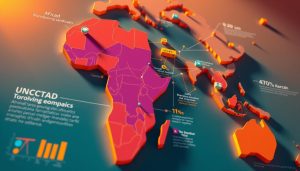Table of Contents
Starting a Business in Africa
The world is now looking at the growing African economies. At Top 100 Business Ideas, we see the huge chance for Africa entrepreneurship opportunities. The young population and fast urbanisation make the African market very promising for new businesses and ideas.
Smart investors see Africa as a great place for business ventures. Here, ideas can grow in many different fields. Our guide offers key insights into these markets, showing strong growth and big potential.
To start a business in places like South Africa, knowing the law is crucial. Investors have several ways to enter, like choosing a Private Company (Ltd) that doesn’t need shareholders to live there. You also need to understand taxes and join groups like the South African Chamber of Commerce and Industry to help your business.
Starting a business also means choosing the right structure, like a sole proprietorship or partnership. Using resources like the Department of Small Business Development or Seda is important. We aim to keep you updated and help you succeed in the African business world.
Understanding the African Business Landscape
The African continent is full of promise, especially in high-growth sectors, digital transformation, and trade investment. It’s key to explore what makes Africa a great place for businesses to thrive.
Identifying High-Growth Sectors
In Africa, some industries are growing fast and have a big impact. These include renewable energy, financial technology, and agriculture. They help the economy grow and create lots of jobs.
The Ventures Platform has helped create over 4,264 jobs. It has also helped companies like SunFi, which has helped over 36,000 people. This has greatly reduced carbon emissions.
Analysing the Impact of Digital Transformation
Digital transformation in Africa is more than just using technology. It changes markets and society. Fintech platforms like PiggyVest have made it easier for over 5 million people to join the formal economy.
This digital growth shows Africa’s potential. Tech successes like InstaDeep and Paystack show a bright future for digital businesses.
Exploring Trade and Investment Frameworks
Africa is making its trade and investment rules better for businesses. New startup bills and reforms are making it easier for companies to start and grow. This is making Africa more attractive for trade and investment.
Understanding Africa’s economy and rules is vital for anyone wanting to do business here. With its tech-savvy people, government support, and global interest, Africa is full of opportunities for investors and entrepreneurs.
Conducting Market Research in African Economies
Market research in Africa is key for business success. It helps us understand consumer trends and find good business opportunities. The continent’s vastness and diversity need a detailed analysis to unlock its potential.
Knowing local demand is vital. For example, North Africa’s IT sector is growing fast, thanks to government support and foreign investments. East Africa’s digital banking, like M-Pesa, shows a promising area for exploration.
- Looking at sectors like Morocco’s automotive industry and Egypt’s wind energy projects helps us see industrial chances and infrastructure readiness.
- Nigeria’s Nollywood has gained global fame, showing a growing market for media and entertainment investments.
- South Africa’s stable economy offers refined legal and financial opportunities, with tech ventures like Amazon’s AWS data centers.
- Political stability, consumer behaviour, and regulations also shape how we enter markets.
To make the most of market research in Africa, we must understand its diverse economies. Tools like the Africa Monitor and the Africa Infrastructure Database are crucial. They provide deep insights into economic activities and demographics, helping us analyze markets better.
By doing thorough market research in Africa, we can spot current trends and predict future needs. This lets us create business strategies that meet consumer demands and market needs proactively.
Creating a Robust Business Plan
In our quest to start successful businesses in Africa, we must grasp the details of business plan creation Africa. A solid business plan begins with a clear vision and a detailed plan to share this vision. It’s not just a formality but a guide for every step of business growth, from the start to the finish. Whether you’re an experienced entrepreneur or new to business, these steps will help improve your strategy.
Executive Summary and Business Objectives
The executive summary is the first part of our business plan. Here, we briefly explain our business goals and main ideas. It should show what we aim to do, why it’s possible, and how we’ll do it. Since about 70% of African entrepreneurs start without a plan, having a clear goal is key to success.
Market Analysis and Strategy Formulation
Good market analysis Africa is essential for making smart business decisions. We study customer needs, market size, and what our competitors do. Only 25% of African startups do this, leading to many failures. By understanding the market well, we can make products that meet specific needs, boosting our chances of success.
Financial Projections and Funding Strategies
The financial side of financial planning Africa is very important. We carefully predict our income, costs, and profits for the next five years. These figures must be realistic and attractive to investors. Unlike many businesses that fail due to bad money management, our plans are based on real market data. We also have clear plans for getting funding, which helps keep our business running smoothly.
By following these steps in our business plan, we improve our chances of starting and growing a business in Africa. Each part of our plan is carefully made to avoid common mistakes that many startups make. With good planning, we’re setting the stage for a bright future in Africa’s thriving economy.
Business Registration and Legal Considerations
Starting a business in Africa is exciting, thanks to the continent’s growing economy and laws that support business. Each country has its own rules for setting up a business. This means you need to plan carefully and think about the legal side of things.
Here’s a closer look at the rules you need to follow and the tax benefits you can get.
Navigating Regulatory Requirements
Regulations in Africa vary a lot from one country to another. For example, in Nigeria, the Corporate Affairs Commission (CAC) has strict rules for starting a business. You need to choose a unique name and get a Tax Identification Number (TIN).
This shows how African countries aim to create a good business environment. They want to help businesses grow and follow the law.
- Submission of necessary documentation such as CAC1.1 form, alongside the memorandum and articles of association in Nigeria.
- Verification of the company name through CAC’s public search facility to ensure its uniqueness.
- Regular filing of annual returns to maintain corporate transparency and adherence to local laws.
Understanding Tax Obligations and Incentives
Some African countries have very good tax deals for businesses. For example, Mauritius has a very low corporate tax rate. This makes it a great place for investors who want to make money quickly.
Things to keep in mind include:
- Mauritius’s corporate tax rate of just 3%, which is among the lowest globally, aiming to stimulate foreign direct investment.
- In Nigeria, after registering a company, obtaining a TIN from the Federal Inland Revenue Service (FIRS) is imperative for fulfiling tax obligations.
- Strategic tax planning in line with the regional benefits each country offers, such as the deductibility of certain business expenses and exemptions available for startups.
By understanding and using the laws and tax benefits in Africa well, businesses can do great. They can also help the continent’s economy grow.
Fundamentals of Financing Your African Startup
Exploring financing options and understanding African startup ecosystems are key to getting capital and growing your business.
Investment trends in Africa have changed a lot. In 2023, there was a dip, but startup funding went from $49 million in 2015 to $400 million. This shows a big jump and makes Africa a great place for investors.
Knowing how to get funding in Africa is important. Diaspora investment funds are a big chance. With more money sent to Africa than aid, these funds could change how startups get money. This shows the potential for good returns and the growth of African startups.
- Fintech gets most of the funding, about 60%, showing its key role.
- Angel investors help a lot, with about 30% of early funding, showing their big impact.
- Programs like Google for Startups and the Tony Elumelu Foundation are big supporters. They help startups get money and connect with investors worldwide.
The African startup scene is growing fast. It needs both local and international investors. There are many funding options, from seed money for new ideas to big investments for growth. It’s a chance for big rewards but also comes with challenges.
As we keep looking at these opportunities, it’s clear Africa’s startup scene is getting better. It’s full of chances and ready for investors. Understanding and joining this ecosystem is crucial for success in Africa’s growing markets.
Infrastructure and Operational Setup in Africa
The growth of business infrastructure in Africa is key to the continent’s economic growth. Improving the operational setup in Africa is crucial. It aims to fill the gaps that have slowed economic progress.
Only 38% of people have access to electricity, and less than 10% use the internet. These challenges are also chances for big changes and new ways of working. About 25% of roads are paved, making it hard to move goods efficiently. This adds 30% to 40% to the cost of goods traded between countries.
Choosing the Right Location and Facilities
Choosing the right place and facilities is a big decision. It affects how well a business works and how far it can reach. The infrastructure, from utilities to transport, is crucial for a business’s success in Africa.
Technology and Supply Chain Management
Using modern technology in supply chains can greatly improve how businesses work. It can also connect them to new markets. Companies like Moniepoint and M-Kopa show how technology can solve old problems and help businesses grow.
There’s a big push to improve Africa’s infrastructure. Spending on infrastructure could reach USD 180 billion a year by 2025. This effort aims to boost both rural and urban areas. It’s set to help the economy grow, making it easier for businesses to expand.
Assembling a Winning Team for Your Business
In setting up a successful business, finding the right team is key. Recruitment strategies in Africa are vital for tapping into the region’s growth potential. Building a team that values innovation and dedication is essential for success in the African market.
- Developing the workforce in Africa is at the heart of our strategy. We focus on growing local talent through training. This ensures our team has the skills needed for today’s business world.
- Our team building efforts focus on teamwork and open communication. This is crucial for adapting to the changing African market.
Companies like Roxell have seen success by expanding their teams. They used strategies that fit the local market and culture.
Our recruitment philosophy is built on the connection between team building and success. We engage in activities like setting up test houses and attending exhibitions. These help us find the right people for our team.
- Finding and growing talent is a major focus. The continent’s entrepreneurial spirit is strong. We aim to turn individual talents into team success.
- Integrating new team members with our values and goals is key. This helps us build a strong and forward-thinking business.
In summary, our dedication to team building in Africa, along with strategic recruitment and workforce development, sets us apart. This approach allows us to tap into the continent’s energy and innovation. It drives our growth in African markets and builds a sustainable future.
Product Development and Service Delivery Models
In Africa’s fast-changing business world, success comes from understanding product development Africa and service delivery innovation Africa. Businesses that focus on these areas can create products and services that meet the needs of diverse people. This ensures they grow and stay strong in the long run.
Innovation in Product Design
Innovation in product design in Africa goes beyond looks. It’s about using local materials and traditional knowledge. This makes products that people can use and find meaningful. Areas like technology, agriculture, and healthcare are seeing big changes, thanks to custom solutions.
Adapting Services to Meet Local Needs
Service industries in Africa are learning to adapt to local market needs. This is key to local market adaptation Africa. Banks are using new technology, and healthcare is tackling local health issues. This makes services more effective and relevant.
Think about the SMART Africa initiative or the World Bank’s climate resilience efforts. These are big steps for businesses to act locally while thinking globally. They use global funds to tackle local problems. These efforts also improve infrastructure, helping businesses grow.
Grasping the importance of innovation in product design and service delivery can bridge the gap between businesses and customers. It creates a cycle of improvement and growth. This way, businesses not only survive but flourish, overcoming challenges and growing across the continent.
Launching Your Business: Marketing and Branding Strategies
When we think about starting a business in Africa, we must consider the unique culture, technology, and commerce of the region. To succeed in marketing and branding, we need to dive deep into local insights and use innovative ways to reach out.
It’s key to grasp the digital world. With high mobile use, especially in South Africa, our branding must focus on mobile. Social media like Facebook and Instagram are crucial. They help us connect with many people, making them great for talking to customers.
- Using local SEO boosts our visibility in African markets. It helps us connect with specific groups, making our brand more relevant.
- Email marketing, with free resources as incentives, helps us keep in touch with clients.
- Influencer marketing, with local figures, creates engaging stories about our brand.
Our marketing in Africa also relies on data analytics tools like Google Analytics and SEMrush. These tools help us see how our campaigns are doing and make changes as needed.
- Google Ads geo-targeted campaigns quickly increase our visibility, which is vital for a new business.
- Creating content like blogs, videos, and infographics that meet local needs helps us stand out as leaders.
Using WhatsApp in our strategy is smart because it’s widely used for direct chats. It lets us send updates, offers, and improve customer service instantly.
In summary, marketing in Africa needs a flexible, culturally aware strategy. By understanding local habits and using modern digital tools, we’re ready for a successful business launch in Africa.
Monitoring, Evaluation, and Scaling Your Business
In our quest to elevate African businesses, understanding the importance of robust business monitoring Africa techniques is fundamental. By implementing successful evaluation methods, companies can substantially enhance both their short and long-term growth prospects. This approach not only ensures ongoing improvements but also facilitates effective scaling, which is vital for navigating the competitive landscapes across the continent.
Setting Up Effective Monitoring Systems
To establish a strong foundation in business monitoring Africa, it’s essential to develop systems that accurately capture and analyse performance data. This involves selecting the right metrics that align with our strategic objectives and deploying the appropriate tools to track these indicators. Effective monitoring acts as a radar, helping to predict potential downturns, identify opportunities for optimisation, and ensure that every aspect of the operation aligns with our overarching goals.
- 66% of companies in Africa that adopt regular monitoring of their KPIs see noticeable profitability improvements within a year.
- Utilising technologies like Solomon’s pilot for mapping in Kenya has reshaped how businesses assess their geographical impact and consumer reach.
Strategies for Growth and Expansion
For scaling business Africa, the approach must be twofold: enhancing internal capabilities and strategically navigating market entry. Expansion often requires a careful blend of resource allocation, market analysis, and adapting to new environments without compromising the quality or values of the service provided.
- 54% of small enterprises experience client turnaways due to infrastructural limitations, highlighting the urgent need for scalable solutions.
- 75% of entrepreneurs point to cash flow hurdles when attempting to scale, underlining the critical role of effective financial management and funding strategies.
Moreover, the integration of adaptive evaluation methods Africa ensures that every step towards expansion is backed by concrete data and a thorough understanding of market demands. This method not only mitigates risks but also maximises the potential for successful growth.
By fostering environments where continuous improvement is the norm and setting clear benchmarks for growth, we can unlock the potential of African businesses and drive them towards sustained success in the global marketplace.
Starting a Business in Africa
Exploring entrepreneurship opportunities in African economies is exciting. The continent is rich with potential, especially in fintech and digital finance. This is thanks to a growing tech-savvy population and widespread mobile use.
Africa’s fintech market is set to grow, reaching US$65 billion by 2030. This growth is driven by a young population with smartphones, making mobile money services popular. Yet, 90% of transactions still use cash. This shows a big chance for digital finance to become part of daily life, helping the 700 million unbanked people.
- Small and medium-sized enterprises (SMEs) create over 70% of Africa’s GDP. This means new businesses have a big chance to succeed locally and globally.
- South Africa and Nigeria are improving their rules for fintech. This is shown by groups like the Intergovernmental Fintech Working Group (IFWG) and regulatory sandboxes.
- But, starting a business is hard, especially getting funding. There’s a need for more ways to fund businesses, not just equity.
Knowing how to get funding is crucial. Crowdfunding and angel investors are becoming more popular. They focus on businesses that can grow fast. Bank loans are still common, with many banks offering loans for new businesses.
- Groups like Seedstars and the Acumen Fund help start-ups. They offer money and teach important business skills.
- Government grants and support from private funds like Helios Investment Partners help too. They give capital to businesses that use technology and innovation.
To encourage business in Africa, we need to help entrepreneurs. This includes finding start-up money and dealing with rules. With lots of mobile use and rules that support new ideas, now is a great time to start a business in Africa.
Investment and Funding Opportunities for African Startups
The world of investment for African startups is full of chances. It’s all about growing the economy in a sustainable way. Many groups offer the money and help startups need. This includes venture capital, angel investors, and big development finance projects.
Securing Venture Capital and Angel Investments
Venture capital in Africa is now looking at the continent’s new ideas. Groups like VC4A and ABAN are key. They give money, advice, and connections to help startups grow.
- VC4A tailors its investments to fit what each startup needs, offering a custom funding approach.
- ABAN connects startups with angel investors who know their field, ensuring a good match.
Grant and Development Finance Options
Grants and development finance are vital for startups facing early challenges. The African Development Bank Group is a big help. They send money to startups. Here’s how different groups help:
- The African Union Commission gives grants for startups with big plans, aiming for wide impact.
- USAID has programs like AWIE to support women-led businesses in Africa, offering full support.
- The Tony Elumelu Foundation gives seed money to startups all over Africa, promoting business growth.
Getting direct investment and using grants and development finance helps startups. It lets them start, grow, and make a big difference in their local economies.
Understanding the Risks and Challenges of Doing Business in Africa
Starting a business in Africa needs a deep understanding of the risks and challenges. The continent offers big opportunities but also has its own set of obstacles.
The complex regulatory environments across Africa are a big challenge. Businesses must be quick to adapt to changing rules and technologies. For instance, Ghana has green mineral policies to help local industries, but other countries have less clear rules that can be risky for businesses.
- The fast-changing economy and varied rules make legal matters tricky.
- Issues like poor power and transport can really slow down business, affecting 80% of African companies, as the World Economic Forum found.
Another big challenge is getting financial help. Mobile money services like M-Pesa are popular, but many small businesses find it hard to get formal loans. Only 1% of SMEs in Africa have access to formal credit, the African Development Bank says.
- Finding money to grow is hard, needing new ways to help businesses.
- Dealing with different currencies and inflation risks makes money matters even harder.
Businesses also face the challenge of Africa’s diverse cultures and ethnic groups. Understanding these differences is key to success. It means creating marketing plans and running businesses that fit local needs.
Despite the challenges, Africa’s market is huge, with over $5 trillion in 2022. But, the digital gap is a big problem. With only 32 countries having less than 50% internet users, businesses face digital hurdles.
In summary, knowing the risks and challenges in Africa is vital for success. By tackling these issues with smart plans and support, businesses can unlock Africa’s vast potential.
Success Stories: Learning from African Entrepreneurs
Africa is full of stories of entrepreneurs who have shown great resilience and creativity. These stories are not just inspiring. They also offer a roadmap for success in tough markets.
Abasiama Idaresit is a great example. He started small and grew his digital marketing business with patience and smart planning. His journey shows the value of never giving up and being flexible. It took him eight months to make his first money, but he then used new marketing ideas to increase his clients’ sales a lot.
- Strive Masiyiwa’s Econet Wireless has grown across many African countries. This shows how important it is to adapt and scale in different places.
- Julian Omalla started with just $100 and turned Delight Ltd. into a big juice company in Uganda. He now has 45% of the market.
These leaders faced many challenges but understood the local needs. For example, Smart Havens Africa offers affordable housing through a rent-to-own model. This shows they really get the financial struggles many Africans face.
- EcoCreditation focuses on making money from cocoa farming carbon credits. This shows how businesses can be green and profitable.
- SokoFarmers in Kenya is tackling food waste. This is a big problem in many African countries.
- ChipChick uses technology to solve the problem of e-waste in farming.
These entrepreneurs have shown many different ways to succeed in Africa. By learning from their stories, we can understand how to grow businesses in various industries across the continent.
More success stories like these are needed. By understanding the journeys of these leaders, we can learn a lot. We can see how they overcame obstacles and what strategies worked for them.
In conclusion, Africa is a great place for entrepreneurs to grow. The success stories of African business leaders are not just personal achievements. They are also important for the whole African business community, helping to build a strong and prosperous economy.
Exploring Support Networks and Resources
In our work across Africa, we find that business support networks and resources are key. They help startups grow and succeed. Groups like Simodisa and the South African Chamber of Commerce and Industry offer crucial support.
There are many programs and initiatives to help. The Jim Leech Mastercard Foundation Fellowship Program is one, looking for African entrepreneurs. The Common Fund for Commodities also offers support for projects that can change commodity value chains.
Deadlines for these opportunities are coming up soon. The Czech Challenge Fund, the YALI Regional Leadership Center, and the USADF Off-Grid Energy Challenge are all offering support. Accelerator programs like GrowthAfrica and the Orange Corners Nigeria Incubation Programme also provide investment for local businesses.
The CAMFED Association is a great example of a network helping women in agriculture. Women make up 29% of the workforce in Sub-Saharan Africa. CAMFED’s work includes peer mentoring and digital learning, even during COVID-19.
These efforts boost confidence, create jobs, and increase household incomes by up to 30%. Governments also support these resources, showing trust in their impact. Our aim is to equip aspiring business owners with the tools they need to succeed.

Africa’s Local Manufacturing & Global Trade Focus
Discover how Africa is focusing on improving its local manufacturing and joining global trade, reshaping its economic landscape.

Explore the Digital World in Africa
Discover the vibrant digital world in Africa, from tech start-ups to innovative e-services shaping the continent’s future. Explore now.

4 Top Markets for Expanding into Africa in 2026
Discover the 4 top markets for expanding into Africa in 2026 with our comprehensive analysis of economic indicators, infrastructure development, and investment opportunities across the continent.

Top 10 Reasons to Do Business in Africa
Discover the top 10 reasons to do business in Africa and explore the vast opportunities awaiting UK companies in this dynamic market.

Advantages of Doing Business in Africa
Explore the unique advantages of doing business in Africa, from diverse markets to rapid economic growth. Discover opportunities for UK investors.
